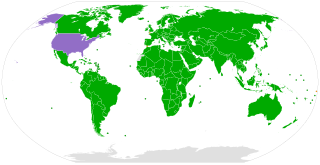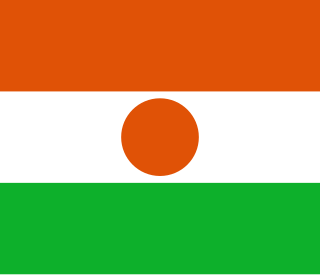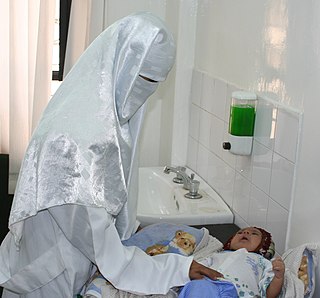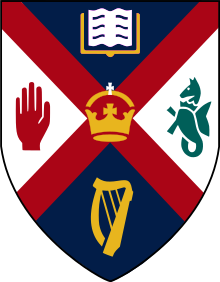
The United Nations Convention on the Rights of the Child is an international human rights treaty which sets out the civil, political, economic, social, health and cultural rights of children. The convention defines a child as any human being under the age of eighteen, unless the age of majority is attained earlier under national legislation.

A corporal punishment or a physical punishment is a punishment which is intended to cause physical pain to a person. When it is inflicted on minors, especially in home and school settings, its methods may include spanking or paddling. When it is inflicted on adults, it may be inflicted on prisoners and slaves.
The Children's Rights Movement is a historical and modern movement committed to the acknowledgment, expansion, and/or regression of the rights of children around the world. This act laid several constitutional laws for the growth of a child's mental and physical health.. It began in the early part of the last century and has been an effort by government organizations, advocacy groups, academics, lawyers, lawmakers, and judges to construct a system of laws and policies that enhance and protect the lives of children. While the historical definition of child has varied, the United Nations Convention on the Rights of the Child asserts that "A child is any human being below the age of eighteen years, unless under the law applicable to the child, majority is attained earlier." There are no definitions of other terms used to describe young people such as "adolescents", "teenagers" or "youth" in international law.
Children's rights or the rights of children are a subset of human rights with particular attention to the rights of special protection and care afforded to minors. The 1989 Convention on the Rights of the Child (CRC) defines a child as "any human being below the age of eighteen years, unless under the law applicable to the child, majority is attained earlier." Children's rights includes their right to association with both parents, human identity as well as the basic needs for physical protection, food, universal state-paid education, health care, and criminal laws appropriate for the age and development of the child, equal protection of the child's civil rights, and freedom from discrimination on the basis of the child's race, gender, sexual orientation, gender identity, national origin, religion, disability, color, ethnicity, or other characteristics.
Economic, social and cultural rights (ESCR) are socio-economic human rights, such as the right to education, right to housing, right to an adequate standard of living, right to health, victims' rights and the right to science and culture. Economic, social and cultural rights are recognised and protected in international and regional human rights instruments. Member states have a legal obligation to respect, protect and fulfil economic, social and cultural rights and are expected to take "progressive action" towards their fulfilment.
The Vienna Declaration and Programme of Action (VDPA) is a human rights declaration adopted by consensus at the World Conference on Human Rights on 25 June 1993 in Vienna, Austria. The position of United Nations High Commissioner for Human Rights was recommended by this Declaration and subsequently created by General Assembly Resolution 48/141.

The right to education has been recognized as a human right in a number of international conventions, including the International Covenant on Economic, Social and Cultural Rights which recognizes a right to free, primary education for all, an obligation to develop secondary education accessible to all with the progressive introduction of free secondary education, as well as an obligation to develop equitable access to higher education, ideally by the progressive introduction of free higher education. In 2021, 171 states were parties to the Covenant.
Evolving capacities is the concept in which education, child development and youth development programs led by adults take into account the capacities of the child or youth to exercise rights on their own behalf. It is also directly linked to the right to be heard, requiring adults to be mindful of their responsibilities to respect children's rights, protect them from harm, and provide opportunities so they can exercise their rights. The concept of evolving capacities is employed internationally as a direct alternative to popular concepts of child and youth development.

The Convention on the Rights of Persons with Disabilities is an international human rights treaty of the United Nations intended to protect the rights and dignity of persons with disabilities. Parties to the convention are required to promote, protect, and ensure the full enjoyment of human rights by persons with disabilities and ensure that persons with disabilities enjoy full equality under the law. The Convention serves as a major catalyst in the global disability rights movement enabling a shift from viewing persons with disabilities as objects of charity, medical treatment and social protection towards viewing them as full and equal members of society, with human rights. The convention was the first U.N. human rights treaty of the twenty-first century.

Education in Niger, as in other nations in the Sahelian region of Africa, faces challenges due to poverty and poor access to schools. Although education is compulsory between the ages of seven and fifteen, with primary and secondary school leading into optional higher education, Niger has one of the lowest literacy rates in the world. With assistance from external organizations, Niger has been pursuing educational improvement, reforming how schools utilize languages of instruction, and exploring how the system can close gender gaps in retention and learning.
The United States has signed the United Nations Convention on the Rights of the Child (UNCRC); however, it remains the only United Nations member state to have not ratified it after Somalia ratified it in 2015.

Women in Yemen have historically been placed at a disadvantage due to their gender, with a highly patriarchal society. Although the government of Yemen has made efforts that will improve the rights of women in Yemen, many cultural and religious norms, along with poor enforcement of this legislation from the Yemeni government, have prevented Yemeni women from having equal rights to men.
Children's rights education is the teaching and practice of children's rights in schools, educational programmes or institutions, as informed by and consistent with the United Nations Convention on the Rights of the Child. When fully implemented, a children's rights education program consists of both a curriculum to teach children their human rights, and framework to operate the school in a manner that respects children's rights. Articles 29 and 42 of the Convention on the Rights of the Child require children to be educated about their rights.
Children's rights in Malaysia have progressed since Malaysia acceded to the Convention on the Rights of the Child (CRC) in 1995 and introduced the Child Act in 2001.
The Islamic Republic of Iran signed the UN Convention on the Rights of the Child (CRC) in 1991 and ratified it in 1994. Upon ratification, Iran made the following reservation: "If the text of the Convention is or becomes incompatible with the domestic laws and Islamic standards at any time or in any case, the Government of the Islamic Republic shall not abide by it."
Foreign aid for gender equality in Jordan includes programs funded by governments or non-governmental organizations (NGOs) that aim to empower women, close gender based gaps in opportunity and experience, and promote equal access to education, economic empowerment, and political representation in the Hashemite Kingdom of Jordan.
Under Italian Law 104/1992, "disability" is defined as a loss of the ability of the person to perform basic daily activities unaided."
The First Liberian Civil War began in 1989, when Charles Taylor 's National Patriotic Front of Liberia (NPFL) forces invaded the country in rebellion against the regime of Samuel Doe, who came to power through the 1980 Liberian coup d'état. Liberians United for Reconciliation and Democracy (LURD), Movement for Democracy in Liberia (MODEL), the United Liberation Movement for Democracy (ULIMO), as well as the NPFL utilized children as an integral aspect of their forces over the course of both armed conflicts, organizing them into factions such as the Small Boys Unit. The First Liberian Civil War as well as the Second Liberian Civil War saw thousands of children were forced to participate in armed conflict, resulting in an estimated figure of 21,000 child soldiers in need of demobilization, rehabilitation, and reintegration following the end of the Second Liberian Civil War in 2003, which concluded with the signage of the Comprehensive Peace Agreement. In the years following the war, the Liberian government was implemented measures to promote their international and national commitment to reintegrating and supporting former Children in the military.
Disability in Kenya "results from the interaction between individuals with a health condition with personal and environmental factors including negative attitudes, inaccessible transport and public buildings, and limited social support. A person's environment has a huge effect on the experience and extent of disability." Having a disability can limit a citizen's access to basic resources, basic human rights, and social, political and economic participation in Kenyan society. There are three forms of limitation of access linked to disability: impairment, disability, and handicap. An impairment is "the loss or abnormality of psychological, physiological or anatomical structure or function." A disability results from an impairment as "the restriction or lack of ability to perform an activity in the manner considered normal for a human being", and the requirement for accommodation. Finally, a handicap "results from a disability, and limits or prevents the fulfilment of a role that is normal for that individual."
Aoife Nolan is an Irish academic who is Professor of International Human Rights Law and Director of the University of Nottingham Human Rights Law Centre. She is President of the Council of Europe's European Committee of Social Rights, and an international advisor on the rights of the child and economic and social rights and strategic legal implications. She has led international research projects and acted as a consultant to United Nations or other global institutions on human rights and strategic law.






